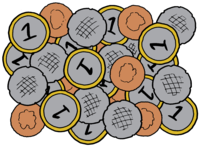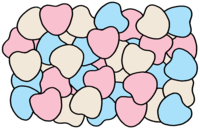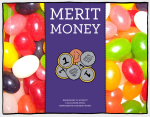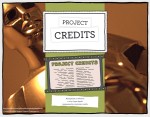I organized a virtual drink on Google Hangouts! We chatted about quitting jobs, raising kids,…
The Merits System
It is clear that the annual bonus system doesn't work. A tremendous amount of research says that it demotivates people, destroys collaboration, and causes dysfunctional behavior among managers and employees.
What also doesn't work is the flat system, where everyone simply gets the same compensation or bonus. This also demotivates most people. And it makes organizations inflexible in times when agility is needed.
What we need is a merits system…
5 Criteria for Fair Compensation
 In an agile organization, working in an uncertain environment, I believe workers should have a steady salary that is predictable and slightly conservative. On the other hand, they should also get extras depending on the unpredictable part of the environment. Both salaries and extras should be brutally fair and based on merits, not equality. This has led me to suggest the following practical constraints, for better compensation systems, based on the five problems listed in an earlier post:
In an agile organization, working in an uncertain environment, I believe workers should have a steady salary that is predictable and slightly conservative. On the other hand, they should also get extras depending on the unpredictable part of the environment. Both salaries and extras should be brutally fair and based on merits, not equality. This has led me to suggest the following practical constraints, for better compensation systems, based on the five problems listed in an earlier post:
- Salaries should be expected, but bonuses should not.
Always keep it a surprise. When bonuses become frequent and anticipated, they ought to be converted to regular salaries. - Earnings should be based on collaboration, not competition.
When determining how much people should earn, the main criteria should be their contributions to a common goal, or shared purpose. - Peer feedback is the main performance measurement.
Contributions to a shared purpose are best detected and evaluated by peers, not by managers. Only the whole system knows all details. - Use creative thinking to grow the compensation system.
Expect that people can (and will) game any system, and tap into that creativity by inviting and supporting it, instead of driving it out. - Use compensation to nurture their intrinsic motivation.
Make money a reflection, not a competitor, of people’s curiosity, honor, acceptance, mastery, and all other intrinsic motivators.
Of course, implementing these suggestions for a compensation system is not a trivial thing. But I discovered different ideas that seem to work pretty well for various creative organizations, and which turned out to be quite compatible with each other, and with the science of behavioral economics [Ariely, Predictably Irrational].
A Better System
The elevator-pitch-version goes like this…
- You start by setting up a virtual currency, such as credits, points, or hugs. And every month every employee gets an equal share of the virtual currency.
- Employees are then required to give all their credits to co-workers. They can use any criteria they want, as long as they don't keep any credits themselves.
- Employees accumulate earned credits (received from co-workers). At random moments they can exchange credits for real money, using an exchange rate.
This is a payment system based on merits. It satisfies all criteria for fair compensation:
- Big bonuses cannot be anticipated.
- Peer feedback is the main performance measurement.
- Earnings are based on collaboration, not individual performance.
- Creative thinking is used to game and tweak the system.
- The earnings reflect purpose, mastery, status, etc…
Run a Safe-to-Fail Experiment
 Money and emotions are tricky things and therefore any system that involves both will have to be set up in a way that is safe to fail. With small increments (such as weekly or monthly experiments instead of quarterly or annual outcomes) the feedback cycle is shorter and people will learn faster how to improve the system. The use of valueless virtual currency instead of real money will allow people to experiment more comfortably, and it will be easier for them to decide that a chosen path is not working, and change direction, or start from scratch. We must also realize that creative people will game the system. But this creativity can be exploited to grow a more resilient system. The short iterations and valueless currency should help people to adapt to each other’s strategies, and management can tweak the constraints, all in favor of collaboration and working towards a common purpose.
Money and emotions are tricky things and therefore any system that involves both will have to be set up in a way that is safe to fail. With small increments (such as weekly or monthly experiments instead of quarterly or annual outcomes) the feedback cycle is shorter and people will learn faster how to improve the system. The use of valueless virtual currency instead of real money will allow people to experiment more comfortably, and it will be easier for them to decide that a chosen path is not working, and change direction, or start from scratch. We must also realize that creative people will game the system. But this creativity can be exploited to grow a more resilient system. The short iterations and valueless currency should help people to adapt to each other’s strategies, and management can tweak the constraints, all in favor of collaboration and working towards a common purpose.
If you are interested, I have a 20-page article about Merit Money available for download.
 This text is part of Merit Money, a Management 3.0 Workout article. Read more here.
This text is part of Merit Money, a Management 3.0 Workout article. Read more here.
Subscribe to my mailing list and be the first to receive future articles!








